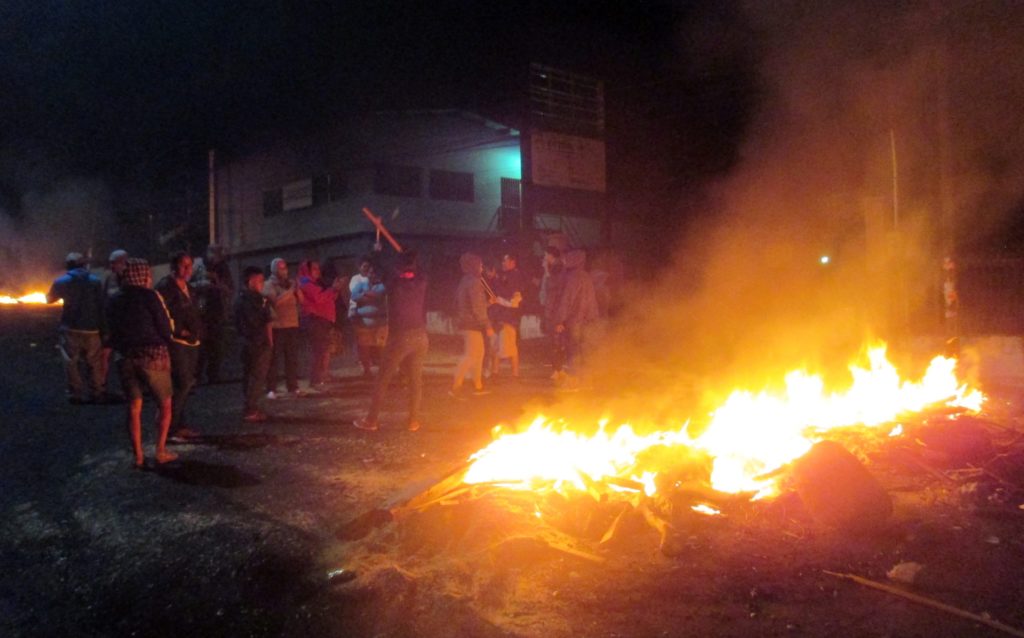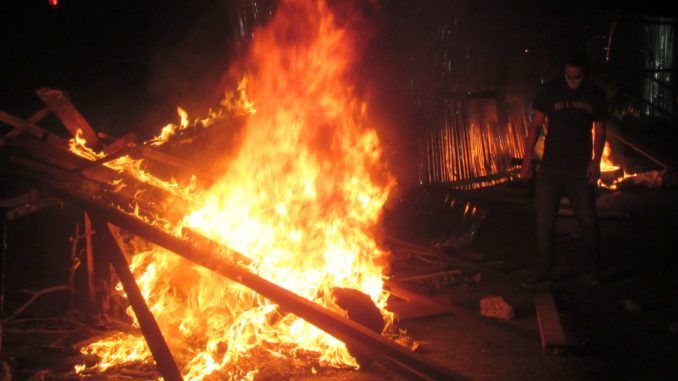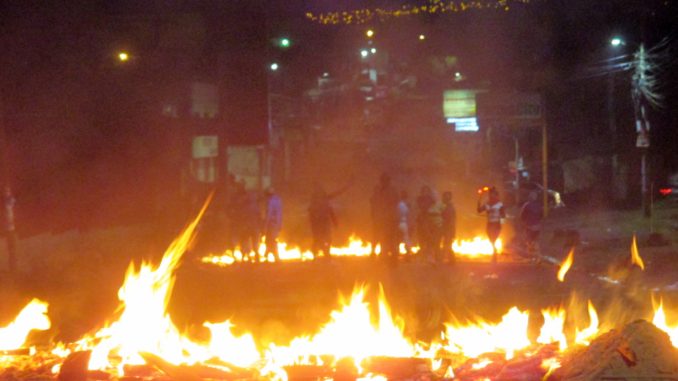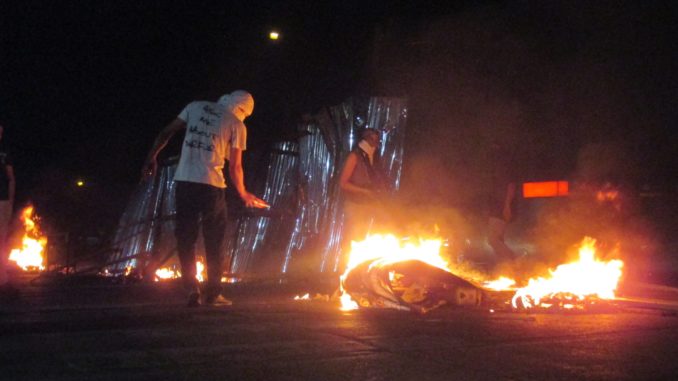
People of all ages gathered in the firelight in the middle of the road. Other residents sat with friends, family, and neighbors on stoops at the road’s edge, chatting and watching the lines of flames flickering across the main street in the El Pedregal neighborhood in Tegucigalpa, the Honduran capital.
Below the first of several fires crossing the street, ashes spelled out FUERA JOH – “Out With JOH” – in reference to Honduran president Juan Orlando Hernández. Hernández was declared president-elect the night before, on Sunday, December 17th by the country’s electoral tribunal amid widespread reports of fraud and an ongoing political crisis. The ashes spelling FUERA JOH had been a burning message to the helicopter circling over the city, monitoring the road blockade actions in the neighborhoods below.
It was after midnight, but that did not keep Angélica Medrano from the protest in El Pedregal. She has been participating in the protests against electoral fraud in her neighborhood since shortly after the November 26 general elections, and does not plan on backing down anytime soon.
“They want to impose a president on us,” Medrano told Toward Freedom. “We don’t want a dictator. We want a country at peace, a free country, and to elect the president that we elected, for whom we voted, because that’s our right.”
While she spoke, Medrano kept an eye on the military police within view. More were in the area but out of sight. They had already cracked down on the road blockade actions in El Pedregal four times that night with tear gas and live rounds, according to residents. Two and a half weeks earlier, on November 30, military police opened fire on a protest in the same neighborhood, wounding several people, including a 12-year-old child.
“The military police is Juan Orlando’s police,” said Medrano. “They repress people,” she began to say, but was suddenly interrupted by a teenage girl calling out a warning: “the military police are shooting bullets up there.”

Honduras is in crisis. The Opposition Alliance Against the Dictatorship coalition’s presidential candidate Salvador Nasralla had a supposedly irreversible five-point lead over Hernández when preliminary results were first announced, more than nine hours after polls closed on November 26. The electoral tribunal’s computer system then went offline for hours, and as results from the remaining polling stations were later posted, Nasralla’s lead quickly plummeted until Hernández was in the lead.
The Organization of American States (OAS) and European Union election observation missions expressed concerns about a series of “irregularities.” The opposition alliance and third place Liberal Party cried fraud, stating that their copies of polling station tally sheets – the same ones sent in to the electoral tribunal – showed Nasralla won. Protests erupted around the country, and the government declared a 10-day state of exception on December 1, implementing a 6pm to 6am curfew and violent crackdowns on protests. Since the elections, more than 25 people have been killed in this context, most of them by state security forces, according to human rights organizations.
The crisis is most intense in the northwestern part of the country, home to the strongest opposition alliance base. Between the textile sweatshops, agro-export crops, and route to the Puerto Cortés port, the region also has the strongest potential for economic disruption.
Protesters have been blockading highways and key city arteries in San Pedro Sula, El Progreso, Choloma, Villanueva and neighboring areas day and night. State security forces have been terrorizing neighborhoods and opening fire indiscriminately, shooting and killing protesters and residents on a near-daily basis. Some protesters have been fighting back, though most “clashes” have entailed people throwing rocks and other projectiles at security forces armed with assault rifles, or burning down police stations and other property damage.

The atmosphere is exponentially calmer in Tegucigalpa, but the story in the capital is not limited to the news coming out of press conferences in upscale hotels and political party headquarters. Neighborhood residents around the city are engaging in collective local action in the streets with fiery nighttime road blockades. Although it is not as extreme as in the northwest and along the north coast, protesters in Tegucigalpa have also faced repression, and several people have been shot and killed by security forces in the capital.
“What we’re doing is saying enough is enough. We’ve had it up to here with all the corruption, all the tricks, and all the shamelessness of this government’s politicians,” said José Luis Mayorga, a local activist in the Morazán neighborhood.
Mayorga has been involved in these kinds of actions before. He was out in the streets following the 2009 coup d’état, when president Manuel Zelaya was ousted by military forces in collusion with forces within the Liberal Party – to which Zelaya belonged – and the National Party. The US, Canada, and other countries quickly recognized and supported the post-coup regime.
The National Front of Popular Resistance (FNRP) arose from existing social movement alliances and incorporated other organizations, anti-coup sectors of the Liberal Party, and members of the public at large. Though it was not a unanimous decision, the LIBRE party grew out of this resistance. The party then formed the backbone of the Opposition Alliance Against the Dictatorship to run just one presidential candidate in the 2017 general elections and have a better chance at defeating incumbent president Hernández of the National Party.
“We’ve been in the struggle. We managed to convert the resistance into a political party, and now we continue to struggle,” Mayorga told Toward Freedom.
Ericson Escobar, on the other hand, is a relative newcomer to street-level political resistance. He had previously supported the Anti-Corruption Party (PAC), which was established in 2012 and garnered a significant chunk of votes in the 2013 general elections. Founded by Nasralla, a well-known sportscaster, the party did not have much of an ideological direction, but its anti-corruption platform resonated with many youth and others fed up with corruption and established politicians.
When Nasralla broke away from PAC following his manipulated ouster from the presidential candidate spot, he joined the opposition alliance and took most of PAC’s base, including Escobar, with him. Since the elections last month, Escobar has been supporting the opposition alliance and participating in protests in the Kennedy neighborhood where he lives. He had never really been out to street protests before, he said.
“I used to be a sympathizer. From now on, I’m going to be an activist,” Escobar told Toward Freedom at one of several road blockades in his neighborhood on Sunday night.
Neighborhood youth were busy that night. The electoral tribunal had declared Hernández the winner hours earlier, and what began as one blockade and barricade across a key boulevard spawned several others at intersections further along. A few dozen people carted a lengthy section of sheet metal, taken from a nearby property, down the street to create a new barricade, chanting along the way: “It’s going to fall. It’s going to fall. The dictatorship is going to fall.”

As people gathered around bonfires, the OAS election observation mission was presenting conclusions at a press conference. The OAS mission refused to validate the electoral tribunal’s final results, explaining that earlier concerns regarding irregularities had not been cleared up. Opposition alliance supporters reached the same conclusion ages ago, and while the mission’s statement was met with some interest by people in the streets, it changed nothing for them.
“We’re a lot of people who are tired of having the interests of the few imposed on us,” said Escobar. “It’s not about right-wing or left-wing.”
Social discontent has been growing for years, he said. The widespread conviction that the opposition’s victory was stolen has been the spark for deeper-rooted unrest to spill into the streets. Christmas is collateral damage, said Escobar. He and many others around Tegucigalpa expect to spend the holidays protesting in the streets.
In the meantime, there will also be daytime actions. On Tuesday, the opposition alliance condemned the killings of protesters by state security forces and called for a series of targeted actions this week, including a protest Wednesday in front of the military Joint Chiefs of Staff headquarters and a multi-pronged march converging on the US Embassy in Tegucigalpa on Thursday. Another national day of action will be held Friday, with more road and highway blockades. The alliance also called for villages, towns, cities and neighborhoods to stay mobilized, but in countless locations where actions have been taking place, people were not waiting around for a call to heed.
Back in El Pedregal, Medrano and her neighbors had no plans to demobilize, despite the repression. In the wee hours of Tuesday, people came streaming down the hill, away from the military police repression further up the street. A faint smell of tear gas drifted down with them, and the military police followed in turn, pursuing residents with batons. Firefighters showed up behind them all, extinguishing the fires and clearing debris. It won’t be long before people regoup, said Medrano.
“It doesn’t stop here. People rest for a bit and then we’re back in the struggle,” she said.
See this previous report by Sandra Cuffe for Toward Freedom on recent events in Honduras: Made in the USA: The Honduran Political Crisis, Rebooted
Sandra Cuffe is a freelance journalist based in Honduras. You can find her on twitter at @Sandra_Cuffe or read more of her work on her website at sandracuffe.com.
